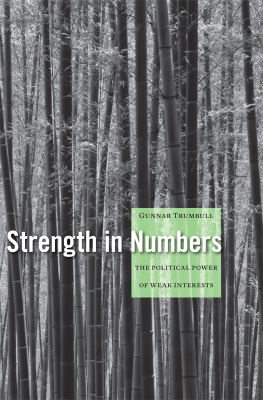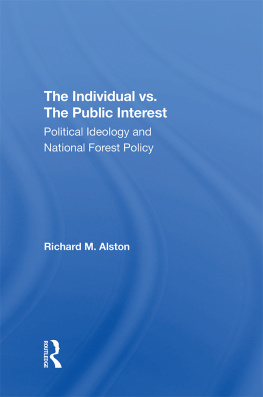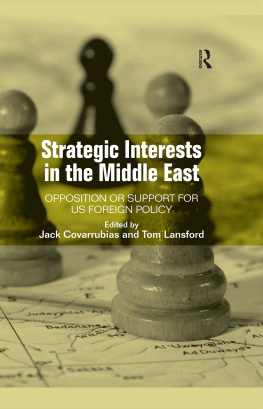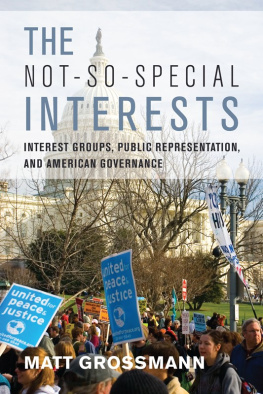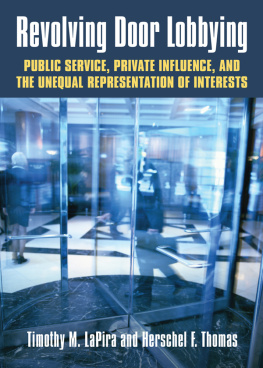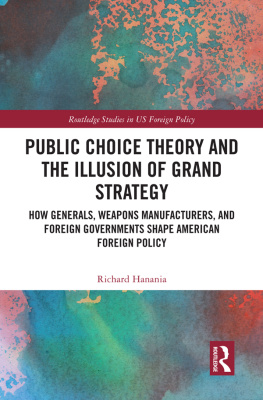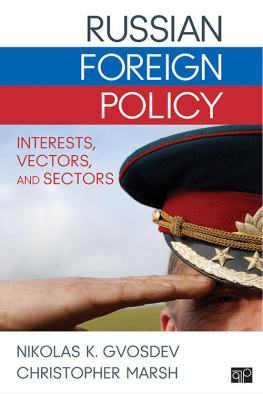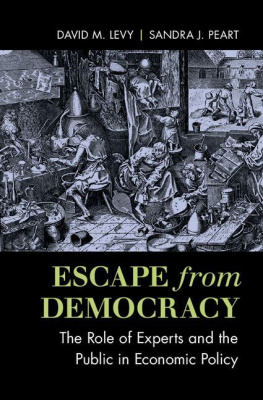Copyright 2012 by the President and Fellows of Harvard College
All rights reserved
Jacket Design by: Tim Jones
Cover image: Photograph (c) Andreas Alterburger
The Library of Congress has cataloged the printed edition as follows:
Trumbull, Gunnar.
Strength in numbers : the political power of weak interests / Gunnar Trumbull.
p. cm.
Includes bibliographical references and index.
ISBN 978-0-674-06641-0 (hbk. : alk. paper)
1. Consumer protection. 2. Trade regulation. 3. Consumption (Economics)Political aspects. 4. ConsumersPolitical activity. I. Title.
HC79.C63T78 2012
381.3'4dc23
2012009690
CHAPTER 1
C ONVENTIONAL WISDOM and a deep tradition of academic research hold that concentrated interests dominate public policy. Through a combination of industry lobbying, campaign finance, direct interaction with compliant government agencies, and informal ties to elected officials, industry is said to dictate the outcome of national regulatory policy. Diffuse interests, by contrast, go underrepresented. The problem they face is one of coordination. Whereas a small number of companies may easily coordinate their lobbying efforts through industry associations, vast numbers of consumers face significant barriers to organizing to defend themselves. On this account, any new regulation that imposes concentrated costs and diffuse benefits should face strong, consistent opposition. Yet diffuse interests have historically nearly always found representation in public policy. Across the advanced democracies, diffuse groups like retirees, patients, and consumers enjoy strong protectionsprotections that were opposed by industry. In cases in which diffuse interests have failed to find representation, this was frequently because they lost to other diffuse interests. Even the most convincing cases of industry influencein sectors such as pharmaceuticals and agriculturereveal clear limitations on industrys ability to influence public policy. Given the organizational challenges facing diffuse interests, and the easy coordination enjoyed by concentrated interests, the question arises as to why companies have not been more successful in achieving their desired legislative and regulatory outcomes. How have diffuse interests come to be so consistently and strongly represented in policy?
The idea that industry gets the public policy it wants represents a fundamental misreading both of the historical record of group mobilization, and of the core logic of interest representation. Historically, even the most challengingly diffuse interests have managed to mobilize to pursue their common interests. And the most concentrated business interests have failed to forestall restrictive regulations. The emphasis that researchers have placed on coordination is heavily overstated. The problem is that the challenge in influencing public policy is not primarily one of coordination. Despite clear challenges, groups with shared interests do manage to organize; when they do not, other actors step in to advocate on their behalf.
The core challenge in shaping new regulatory policy is the need to make that policy appear legitimate . In certain cases, the requirement of legitimacy inverts the logic of collective action embraced by advocates of coordination models of public policy influence. On the one hand, diffuse interests may actually benefit from the organizational challenges they face. Given the real difficulties of organizing, groups that do manage to mobilize an activist membership enjoy a heightened (but not unlimited) degree of policy legitimacy. Successful mobilization serves as a signal that the policies being advocated represent real underlying interests that are deeply held. On the other hand, concentrated interests with easy access to policymakers are viewed with suspicion, and the policies they advocate necessarily attract critical scrutiny. To achieve their policy goals, concentrated interests must either attempt to obscure their influence, or, more commonly, present their preferences as representing broader societal interests. This need to link their narrow interest to a related diffuse interest provides more than just a fig leaf for raw economic interest: it places significant constraints on the discretion that even powerful economic actors enjoy in influencing public policy.
In the United States, where the coordination theory of regulation first took hold, views about the influence of concentrated interests on public policy have left their imprint on the regulatory culture. For the political Left, the threat of business influence has been used to justify keeping industry as far as possible from regulators. For the political Right, the idea that policy was subject to industry capture was used to justify a broadly deregulatory view of government. Even in areas in which regulation might otherwise be warrantedareas like competition policy and product safetythe reality of business influence served as a warning that even legitimate interventions would inevitably be hijacked to fulfill narrow interests. The result was a regulatory culture that oscillated between deregulatory intuitions punctuated by periods of recrimination against industry for the consequences resulting from failures of regulation.
Collective Action and Policy Influence
Mancur Olsons 1965 The Logic of Collective Action launched a generation of research into the challenges of economic organization. His critique of earlier scholars of interest group pluralism was not new. Two years earlier, historian Gabriel Kolko had published an account of Progressive-Era reformsrail, food, and banking regulationthat reinterpreted these reforms as the product of business control over politics. From Mancur Olson and George Stigler to James Q. Wilson, our most notedand most heavily citedtheorists of organization and regulation have argued that diffuse interests are therefore weak interests. The logic of their case was based on the problem of free riders. When the benefits of organization cannot be excluded from the general public, individuals will have insufficient incentives to support a collective lobbying effort. The larger the number of individuals in a group, the harder the group will be to organize, and the more potential supporters will have an interest free riding. This coordination problem makes organizing diffuse interests a harder job than organizing concentrated interests. Olson and the many regulation theorists who followed him saw in this coordination problem an explanation for the neo-Marxist insight that the concentrated interests of a few could outweigh the diffuse interests of the many.
Olsons emphasis on coordination was not the only explanation for industry dominance of public policy. In Politics and Markets , Charles Lindblom attributed industry influence to the economic weight of industry. Because government relied on business for tax revenue, business always exerted an implicit holdup threat.
In political science, Russell Hardins Collective Action elaborated Olsons insights in game-theoretic terms.
Almost immediately after they emerged, these theories began to face empirical and theoretical challenges. Empirically, there was increasingly strong evidence even in the United States that diffuse interests in fact did often manage to find representation in public policy. Consumers were benefiting from progressive trade liberalization and regulatory protections. In fact, while Mancur Olson was writing his influential The Logic of Collective Action , three other authors were publishing books that would ignite the very sorts of collective movements about which Olson was so pessimistic: Ralph Naders Unsafe at Any Speed (1965), Betty Friedans The Feminine Mystique (1963), and Rachel Carsons Silent Spring (1962). The new social movements of the 1960s and 1970s for which these books became touchstones brought together a variety of diffuse groups that shared common social and progressive causes.

